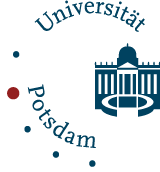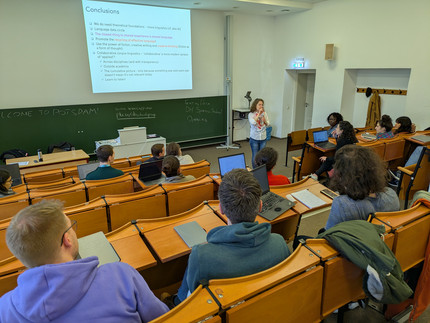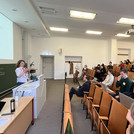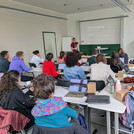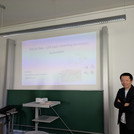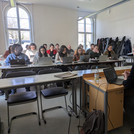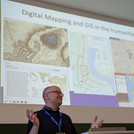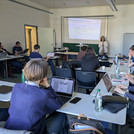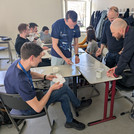Digital Humanities Spring School in Potsdam
From March 31 to April 4, 2025, the Digital Humanities Network (in cooperation with the Department for Digital Humanities and Social Sciences of the University of Erlangen-Nürnberg) hosted the first Digital Humanities Spring School "Text as Data".
Over the course of five days, 18 students from four continents came together to explore the latest methods and applications in the field of Digital Humanities. The school was completely free of charge for the students, with additional travel grants available.
The school was opened by an inspiring keynote by Michaela Mahlberg(Friedrich-Alexander University of Erlangen-Nuremberg), who demonstrated how corpus linguistics can be used to study water-related narratives in climate stories, e.g. by tracking everyday perceptions of water through corpus linguistics methods such as collocation extraction.
The first day continued with a workshop on operationalisation in the DH conducted by Luca Giovannini and Daniil Skorinkin (University of Potsdam), and later a lecture by Manfred Stede (Potsdam) on the quantitative analysis of the framing in scientific editorials on climate change.
Day two featured a topic modeling workshop by Keli Du (University of Trier) and a hands-on tutorial on LLM-based annotation, offering participants a glimpse into cutting-edge NLP techniques.
The third day centered on stylometry: Jan Rybicki (Jagiellonian University, Kraków) provided a lively introduction to stylometric methods, showcasing examples from his research on film scripts and dialogue analysis. This was followed by extensive stylometry workshop led by Artjoms Şeļa (Institute of Czech Literature, Prague).
On day four, the focus shifted to GIS applications in Digital Humanities.Leif Isaksen (University of Exeter) delivered a lecture on mapping historical data and then led a workshop with Dinara Gagarina (FAU Erlangen-Nuremberg), where participants learned how to use QGIS to map locations from a novel (Robert Louis Stevenson’s Kidnapped).
The final day featured a network analysis workshop led byAnastasia Glawion (FAU) and was concluded by an engaging keynote by Frank Fischer (Free University of Berlin) on "programmable corpora" (with reference to the Potsdam-based DraCor project) and "rich metadata".
Throughout the week, students enjoyed a mix of lectures, workshops, and informal interactions. Highlights shared on social media captured memorable moments, from rating lunches at the university Mensa (and plotting the results) to exploring fanfiction communities through network analysis.
We are grateful to all participants and instructors for making this Spring School a lively, insightful, and truly international event. We look forward to welcoming you again in Potsdam!
Student feedback
"...It was so informative and fun, and you all made the material so approachable without sacrificing hard skills training or complexity. I really appreciated the introduction to DH methods, and am looking forward to integrating what I've learned into my research!"
"..I want to express my heartfelt thanks for the valuable program. It was exceptionally well-organized, both in content and in form, and I’m truly grateful for the opportunity to take part..."
"...It was incredibly helpful to become familiar with so many useful tools, to review case studies from experts in the field who regularly engage with them, and to put them into action myself. [...] As an immediate outcome of the “Text as Data” training, I have decided to use exploratory tools to newly look at my “data” and to determine how adding another layer to my analysis would enhance it..."
